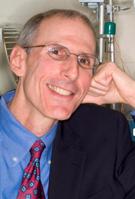
The teaching philosophy of Stephen DiCarlo, Ph.D., professor of the Department of Physiology at the Wayne State University School of Medicine, is highlighted in this month's online publication of Advances in Physiology Education.
Dr. DiCarlo was selected by the American Physiological Society to present the Claude Bernard Distinguished Lecture in April at the Experimental Biology Meeting in New Orleans, La. His lecture, "Too Much Content, Not Enough Thinking and Too Little Fun," along with a profile of Dr. DiCarlo, was published by Advances in Physiology Education.
"I was extremely pleased and deeply honored to receive the award," Dr. DiCarlo said. "Teachers often overrate the importance of their content and underrate their influence. However, students forget much of the content that they memorize. Thus, attempts to teach students all that they will need to know is futile. Rather, it is important that students develop an interest and love for lifelong learning.
"Inspiring and motivating students is critical because unless students are inspired and motivated our efforts are pointless," he said. "Once students are inspired and motivated, there are countless resources available to learn more about a subject."
Instructors, he said, must abandon the theory that unless they "cover the content" students will be unprepared. Rather than worry about "losing" or "wasting" lecture time, teachers should concentrate more on in-class discussion, collaborative problem-solving and inquiry-based activities. Designing activities that focus student learning on how to use scientific knowledge, he said, is more important than "covering content."
"This is important because learning is not committing a set of facts to memory but the ability to use resources to find, evaluate and use information," Dr. DiCarlo explained. "In fact, memorizing anything discourages deep thinking. Deep thinking is essential because understanding is the residue of thinking. To encourage thinking we must create a joy, an excitement and a love for learning. We must make learning fun, because if we are successful, our students will be impatient to run home, study and contemplate -- to really learn."
As for his philosophy on teaching medical students, Dr. DiCarlo said the title of his paper says it all.
"We must approach our teaching with the same seriousness and effort we devote to our research. Since we will be interacting with several hundred students a year, nothing we will ever do in the research lab is as likely to impact on so many lives," he said. "Thus, the impact of our teaching will extend long beyond our lifetime because a small part of every teacher is in the students we touch."
Dr. DiCarlo's presentation can be read in its entirety at http://advan.physiology.org/cgi/content/full/33/4/257.